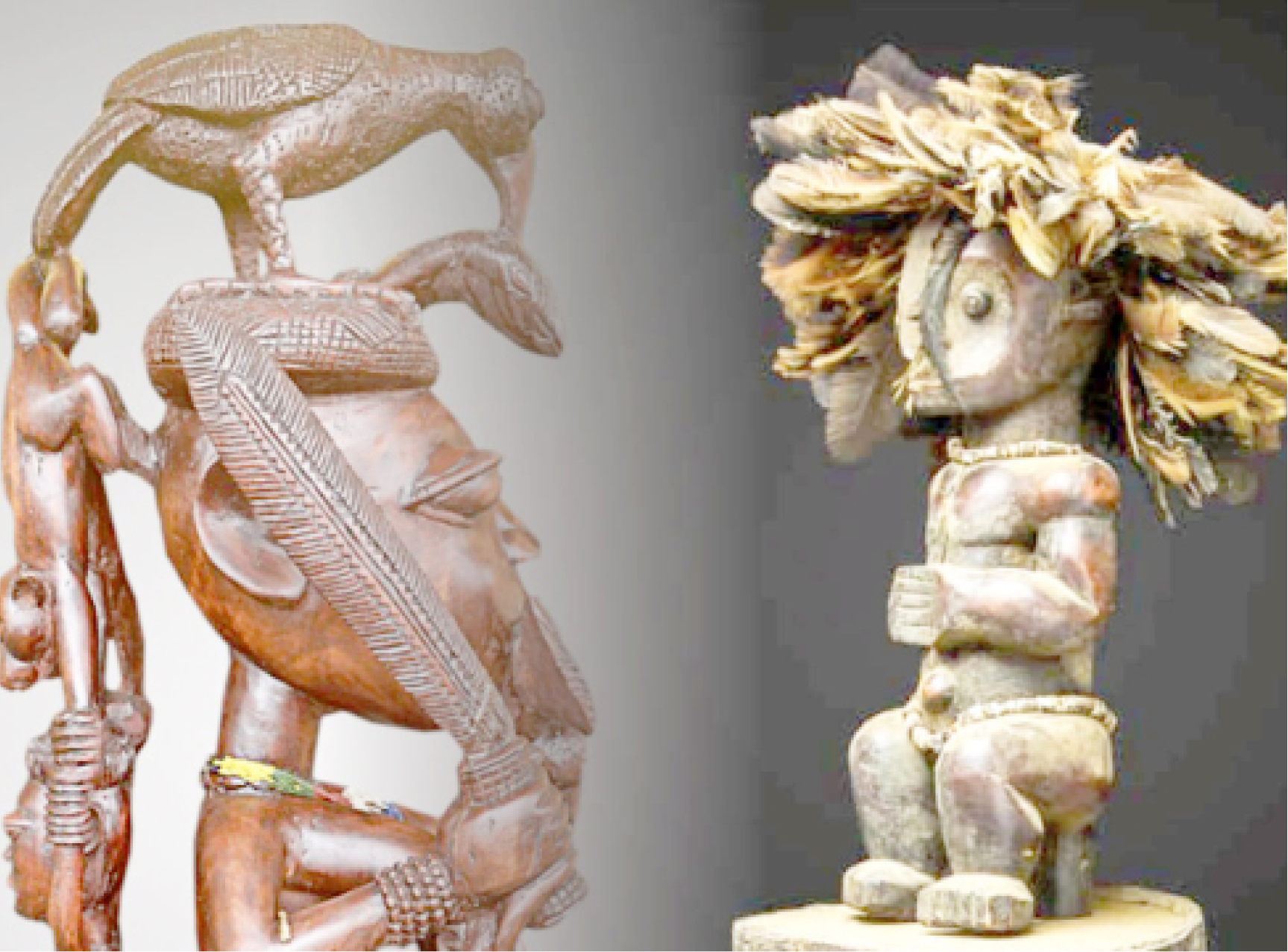Recently, the Ooni of Ife, His Majesty, Oba Adeyeye Enitan Ogunwusi opened an exhibition of 60 artefacts sourced from Ife and beyond at the Brazilian Consulate in Lagos. Daily Trust on Sunday reports that there were gods, witches and warriors.
Through one of the great ebony doors at the Brazilian Consulate in Lagos, one of the first things that confronted the visitor was a naked deity, breasts jutting out, hands raised to the level of her shoulders, clutching two objects that could have been leaves, or heads of serpents with tongues flicking out. Her hair, reminiscent of Medusa, stands in thick strands, like juvenile pythons.
Her minder for the day was Odun Ayo. He points at her with a smile and introduced her as Iya Abiye, the Yoruba divinity who guarantees safe delivery for her devotees. The bronze statue, encased in a glass and mounted on a plinth, is from the 17th century, Odun Ayo said, and she was making her debut at the Brazilian Consulate.
She was not alone. In her company were other benevolent deities like Osumare, the Yoruba goddess of colours, and Orunmila, who dispenses wisdom as he pleases. There were other terrifying ones as well, like the squat figure of Agemo, also encased in a glass, whose role was to arbitrate marital disputes.
“When there is a breach of trust between couples, instead of arguing, the couple would come to Agemo and swear an oath,” Mr Ayo said. “Within three days, the stomach of the person who swore the false oath would start swelling and he or she would die.”
A dreadful faith from a petrifying deity who, like the 60 others or so artefacts in the gallery, drew some excited audience. There were fascinating historical artefacts that only a couple of days before had drawn hundreds of people.
That time, it was a balmy night in Lagos. Oba Ogunwusi himself, the spiritual head of the Yoruba people, had walked the grounds of the Brazilian Consulate to formally open the Yoruba Mobile Museum, showcasing about 60 artefacts from Ife and other Yoruba city states and beyond. Somewhere in the mix, Odun Ayo pointed out a menacing-looking statue from Congo, perched in its glass casing, with a shaggy crown of feathers like a lunatic, holding up two thumbs in a chilling gesture of confidence and terror.
There were bronze statues of slave processions that a century after slavery, still manage to incite anger, outrage and pity. There was also a magnificent wooden carvings of an elaborate war procession.
In a separate room, the entrance guarded by two standing banners advertising “401 Deities,” are less creepy artefacts. Here, one finds the ubiquitous Ife heads, incredible mask with elaborate facial scarifications that are world famous, gilded and bright in well-lit casings. The Ooni of Ife called them “Treasures of our ancestors,” his voice rising as he did so.
Among them, Mr. Ayo pointed out Obalufon, the statue of a famous Ooni who ruled for a long time.
“He ruled for 400 years,” Ayo said. “Every time he was supposed to die he would transform himself and continue ruling until other ruling families complained that he should let them have their turns.”
The present Ooni has only been on the throne for four years, but it was clear the exhibition meant a lot to the 42-year old monarch, who opened it at a ceremony to commemorate the Brazilians Independence Day.
Why Brazilone may ask?
The Ooni has visited the South American country not too long before and had been impressed by the evidence of the Yoruba heritage there. He declared the Brazilian city of Salvador the “capital of the Yoruba in the Americas.” The Ooni is convinced there are more Yoruba descendants in Brazil than there are in Nigeria, no thanks to the transatlantic slave trade.
The Brazilian Consul General in Lagos, Helgas Samuel Bandeira, said the choice was a celebration of Brazilian and Yoruba independence.

“We have a good relationship with the palace of the Ooni of Ife. Ever since he went to Brazil, he started talking to us about setting up a mobile Yoruba museum, and he was fascinated with the strength of Yoruba culture in Brazil and how it is a part of Brazilian culture,” he said in his office, with a small cup of Brazilian coffee in his hand. The strong smell fills the office as he sat behind his desk while speaking to Daily Trust on Sunday.
This was a couple of days after the opening, characterised by much funfair, speeches, music, dancing and a cutting of a sparkly cake. Trust the Brazilians; they know how to throw a party.
That night, it was impossible to talk with Mr Bandeira as there were too many people; 600, they say. But on the day of the interview, he was relaxed, coffee in hand and had the smile and confidence of one who had pulled off a successful event that drew prominent Yoruba leaders, historians, lovers of the arts, history and culture and a huge number of the Brazilian community resident in Nigeria.
All of those guests walked through a tunnel of canopy that ran from the gate to the compound of the consulate, its walls displayed photos of the Ooni’s visit to Brazil. The tunnel symbolised the connection between the Brazilians and Yoruba people. It was dismantled in the days after, but the artefacts would stay on for a further couple of weeks.
“I was very excited from the beginning. From the beginning I told the Ooni that the doors of our consulate would be open and he too was excited to participate in our national day celebration,” Bandeira said.
For the Ooni, who spoke to Daily Trust on Sunday at the opening ceremony in a makeshift palace in the foyer of the consulate, his excitement was palpable.
“It is important for us to showcase our heritage, culture and tradition. This is the time we have to talk and tell our stories. Nobody tells the story of the black man. They tell the story on our behalf, we do not tell our stories. And how can we tell our story? It is through our heritage, artefacts and antiquities and remembering the names and works of our ancestors. That is why I am starting from Yoruba land to partner with many countries to showcase our heritage, culture and tradition,” he said.
Mr. Bandeira would echo these words two days later. “What I often tell people is that if you don’t know your past, you don’t know who you are or what type of future you want to build for yourself,” he said. He would demonstrate this with an example of his native Brazil, which he called a developing country.
“We want to develop, but we don’t want to copy the US. We want to remain Brazil, and I think the same applies to Nigeria,” he said.
The collection exhibited at the consulate was only a sneak peek of the mountain of artefacts the Ooni boasts of. Bandeira said the space was not enough for everything, and the Ooni, in a separate interview, said the same. But he was mightily proud of what he had exhibited, saying it took him a lot of effort, time and money to recover the artefacts that celebrate the history and heritage of his people.
“I am proud to tell you that everything you are seeing on display is 100 per cent done by Nigerians – the gold casting, the bronze casting, the stone faceting and polishing, the stone mining – everything. No external force.
“We are showcasing these in a mobile museum that has social and economic benefits. Many industries will spring out of this mobile museum. So you can see how passionate I am about this,” the Ooni said.
The fact that Nigerians curated and managed this exhibition, of which the Ooni is very proud of, was also something Bandeira harped on.
“What is special about this exhibition is that it is organised by Africans, curated by Africans, and I think it is really fascinating that this is the Yoruba telling the story of the Yoruba. I think it is something that the whole world deserves to see,” he said.

A good number of the artefacts, the Ooni said, had been properly carbon- dated, as some of them are older than the artefacts uncovered in Egypt.
“We have artefacts that are 13, 000 years old. We have others that are 5, 000 years old, 6, 000 years old. We have them here. Are you not happy to see them and document them? Do they look archaic?” he said.
The Ooni is especially proud of the “Treasures of Our Ancestors” for which he sees a lot of “economic value” for Nigeria.
For Bandeira, everything on display was impressive. “I think the whole collection makes a lot of sense,” he said.
The Brazilian connection
Scouring the exhibition, one finds bronze artefacts from Benin, wood carvings from Ife and Osogbo and others, and even from Congo; nothing from Brazil.
“This is a private collection of the Ooni of Ife himself, and I don’t think the palace has artefacts from Brazil; but if you go to Brazil you will see this artefacts and visit houses of worships – Camdoble and Umbanda – which are religions built on Ifa. You will come across a lot of them. It is not Ifa itself, but it draws inspiration from her. There is a kind of religious syncretism in Brazil between all of these different religions,” Bandeira explained.
The connection between the Yoruba and Brazil is deep. Hundreds of thousands of Yoruba slaves were shipped to Brazil, most of them through Valongo Wharf. Many of them carried their language with them, and in a corner of their hearts, they carried their gods and deities across the oceans into new lands, where they learnt to worship them in new ways and new languages.
Candomble is one of the most popular religious practices in Brazil. It mixes afro-Brazilian religious practices of the Yoruba and other slaves with other Brazilian religious practices to form something new, the chief god of Camdobleis called Olodumare. There are hundreds of deities called Orishas.
Umbanda, on the other hand, is a mixture of African, Brazilian, Indian and aspects of Catholicism. It incorporates both African gods and catholic saints.
These faiths originated from Salvador, capital of Bahia, the port city through which about 7million African slaves were shipped into Brazil.
The slaves were baptised Catholics, but the slave masters did not at first bother that the Africans kept their drums and their gods. When they attempted to suppress these practices, branding them as witchcraft, the slaves hid the deities behind the Catholic saints, and in some cases, merged the saints with their gods.
Four hundred years later, the product of that merger is still a curious blend of history, spiritualism and intriguing practices that have fascinated the world for long.
Many researchers have visited Salvador to trace the original religious practices of the Yoruba people. The Ooni also visited and declared the city the capital of the Yoruba in the Diaspora in the Americas.
“It makes sense for the Ooni to declare Salvador the capital of the Yoruba of the Americas. This means recognition for the roots of Brazil and it is good to make sure all the connections are maintained; and I think that by his visit and act, he reinforces that idea,” Bandeira said.
But with this exhibition, which was meant to travel, it is not only the connection with the past that the Ooni seeks to maintain. The connection with the future is also important. Younger Yoruba people are ignorant of their history, no thanks to the new faiths that have branded traditional belief systems as savage and barbaric and artefacts as fetishes. The Ooni is keen for young people to see the exhibition. Just as he is keen for the exhibition to travel.
“Well, we have bases in two countries, a base in Nigeria, the kingdom of Ife and the cradle of the entire Yoruba people. We have a second base in Brazil. From there, it can move all over the world for a few months in each place, depending on the understanding we have. We want to change the narrative and that is what we are doing,” he said.
How successful this exhibition would be on the road remains to be seen. What is clear is that for two weeks, the Yoruba deities from Ife and beyond had a swell time in the Brazilian consulate in Lagos.

 Join Daily Trust WhatsApp Community For Quick Access To News and Happenings Around You.
Join Daily Trust WhatsApp Community For Quick Access To News and Happenings Around You.


